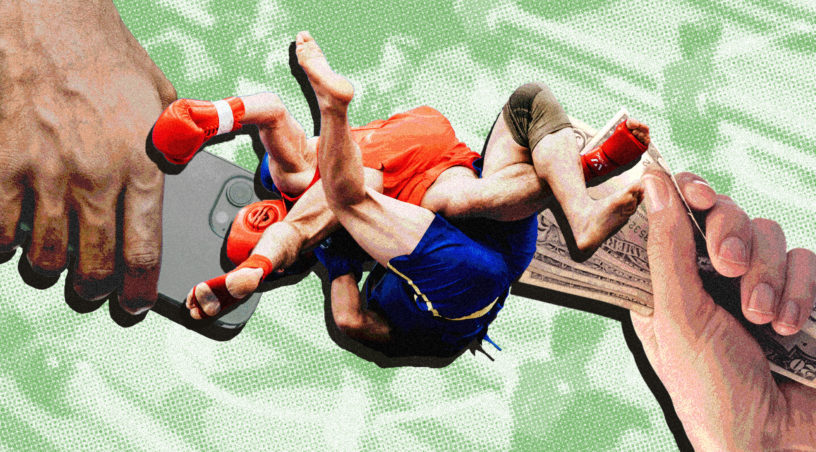By Rob Vona
Visuals by Jay Ashdown

Evan Doerfler walks out of his room during his first year in sport media at Toronto Metropolitan University (TMU) and crosses paths with his roommate.
The two lifelong sports fans often chat about their favourite play from the night or a big game coming up. However, this time, they talk about the parlays they can make and potential bets they can wager on for the night.
“It was kind of a bonding point, to be honest,” Doerfler says. “It’s kind of how we started to get close.”
He already knew about sports gambling before that moment but had never tried it out.
Doerfler says sports gambling is a hobby for him and admits to having taken part in it since he started with his roommate. He frequently bets on hockey, football and basketball during their seasons that stretch from September to April.
“I don’t splurge a lot of money because I can’t afford it,” he says. “But I do like to do it, especially on football weekends.”
“If you watch a sports game, you’d basically think you were at a casino with the number of sports gambling-related advertisements”
According to a collaboration between CBC’s Marketplace and British researchers at the University of Bristol, the average viewer spends up to 21 per cent of every game watching ads about sports betting on TV. In the nearly two years since sports gambling has become regulated in Ontario, it has impacted the province’s sporting world in unimaginable ways, taking the reins on how die-hard fans and casuals alike consume sports.
Prior to 2021, Canadians would spend approximately $14 billion annually on illegally conducted sports betting. These were organized by both black-market criminal networks and grey-market in offshore jurisdictions, according to the Canadian Gaming Association. Black market betting is illegal whereas laws are unclear in the grey market.
Nigel Turner, an independent scientist and psychological researcher with the Institute for Mental Health Policy Research at the Centre for Addiction and Mental Health (CAMH), says there are far too many betting ads during a game, thus resulting in an increase in people taking part in sports gambling.
He says although sports gambling makes up a very small percentage of the total money generated by the Ontario Lottery and Gaming Corporation (OLG), the revenue is still growing.
According to Turner’s research, since Ontario expanded its legislation to allow commercialized sports betting in 2022, OLG’s total revenue relating to internet gaming sits at $1.4 billion. The portion of that total revenue generated from sports betting alone is $433 million.
“If you watch a sports game, you’d basically think you were at a casino with the number of sports gambling-related advertisements,” he says.

Doerfler fondly remembers the point in time when he realized that sports betting was much bigger than he had initially thought.
He saw a commercial for the popular betting app Bet365 that featured Breaking Bad actor Aaron Paul showcasing the live betting odds for the game on the broadcast.
“It’s super cool that they’re able to do that,” he says. “But it’s just crazy that it’s like ‘OK, is this really what we’re focusing on?’”
Under the bright fluorescent lights of Toronto’s Scotiabank Arena on Feb. 28, Aryan Babbar, a second-year business management student, sits in the crowd to watch the Toronto Raptors take on the Dallas Mavericks. While taking in some late-season basketball, his attention is pulled away from the game and settles on the numerous ads scattered across the hardwood floor.
He couldn’t help but notice the light blue logos of FanDuel—another popular betting app—plastered all around the arena. This, among other ads, makes him realize that sports betting may be a bigger topic than he originally thought.
“I didn’t expect it to be this common,” he says. “I’d say every third person I meet could have a FanDuel or Stake account.”
In the same Marketplace study, FanDuel was the brand that accounted for the most messages during the duration of the study.
Babbar takes part in sports gambling but feels he has enough self-control to set his limits. He says while he doesn’t make big deposits into his own accounts, he sees how others can get carried away—especially when they try to make back their losses.
Since the regulations changed in 2022, Steve Rose, an addiction counsellor in Ontario, immediately noticed a shift in the clients he took in. Rose helps those dealing with various addictions including substance abuse, gaming as well as internet and gambling addictions. He says, that since regulation changes, he deals almost exclusively with clients who are suffering from a sports gambling addiction.
“The whole culture around gambling right now has completely changed,” Rose says.
He describes the majority of those suffering from sports gambling addiction as a part of a similar demographic: young men.
According to a 2023 report by the Journal of Gambling Studies, 74.3 per cent of people who called the Ontario Problem Gambling Helpline for online gambling identify as male. In addition, 56.5 per cent of those people are below the age of 35.
He says that prior to the rise in popularity of online gambling, sports betting was something that was typically done in person.
“Gambling was something that you would do on a special occasion, in a physical location that you would have to go to,” he says. “It was an outing.”
“Ever since it got started, every other commercial you see is related to betting…it seems to be everywhere now”
The same research from the Journal of Gambling Studies shows from June 2021 to March 2022, 25.2 per cent of calls to an addiction helpline were related to in-person slot machines. During that period, 8.9 per cent of calls were related to online sports betting.
As online sports betting became more popular, the same study shows the number of slot machine-related calls dropped to 19.4 per cent. As a result, the number of calls for online sports betting saw a noticeable increase, rising to 9.2 per cent of calls to addiction helplines.
Rose says the common denominator amongst his clients is the number of ads showcased on TV. He says that some of his clients believe these ads “should be illegal” and often describe them as “evil.”
“It’s changed the experience of sports. So if somebody was once a sports fan, once they get a gambling addiction regarding sports, there’s not much ‘fan’ watching going on, it’s a lot of ‘gambling’ watching,” he says.
Being a mixed martial arts, basketball and soccer fan, Babbar admits sports gambling has shifted his fandom by allowing him to make an “in-depth” analysis of the game he is watching.
“When I’m watching the NBA, before gambling I wouldn’t say I really cared about how many assists [a player records],” he says. “Those factors I wasn’t paying attention to, now those are something I look more forward to.”

Babbar believes sports gambling as a whole is dangerous. However, he also thinks its legalization has brought more people toward the games themselves.
An article from Forbes says since sports betting was legalized in some U.S. states in 2022, NFL regular season games have attracted an average of 17.9 million viewers, which is a 20 per cent increase from 2017.
Babbar says one positive takeaway from sports gambling being legalized is the increase in engagement and support of a team or an individual player.
“I feel like sports gambling has always been a thing,” he says. “Now that it’s been legalized, not only does it bring more people towards sports, but it also brings a whole new target audience towards a sport.”
While sitting on his couch watching sports on his TV, Joshua Alderman, a first-year sport media student at TMU, sees various betting props on the screen in front of him. A media personality from Sportsnet, Cabbie Richards, is covering the array of props for their audience.
As he continues to watch sports daily, Alderman begins to notice a trend. Sports broadcasts have in-game segments highlighting odds for the game.
“A culmination of all those things has really made me realize ‘OK, this is a thing now, this is going to stay,’” he says.
Alderman has multiple friends who gamble on sports but chooses to not partake in it himself.
He says the sheer addictive quality of gambling—along with seeing some of his friends progressively become more integrated into sports gambling—steers him away from trying it out himself.
Around 64 per cent of Canadians aged 15 or older gamble in some capacity according to a 2022 Statistics Canada study.
A constant reminder for Alderman is the number of ads he sees on TV. He describes the promotion of sports betting as “overwhelming.”
“Ever since it got started, every other commercial you see is related to betting…it seems to be everywhere now,” he says. “Just because it’s legalized, doesn’t mean it needs to be everywhere.”
In an attempt to regulate how sports gambling is promoted, the province of Ontario recently put a ban into effect that prohibits professional athletes and celebrities from appearing in online gambling ads.
As of Feb. 28, no active or retired athlete is to be featured in advertising and marketing for Internet Gaming in Ontario, except advocating for responsible gambling practices.
Jeff Derevensky, the director of the International Centre of Youth Gambling Problems at McGill University, says he has noticed an increase in the interest in sports gambling over the last couple of years—along with an increase in the number of calls to helplines dealing with sports gambling addiction.
Amidst a rise in the number of people developing an addiction to sports gambling, Derevesnky believes various forms of regulations will help lessen the curve. He says these regulations can include stronger age verification checks and more public awareness and knowledge to parents on the dangers of sports gambling.
“I think we need to ramp up our helplines to help gambling problems in general and sports gambling in particular,” he says.
Derevensky also says keeping spending limits on youth in particular is one way to decrease the number of younger, more immature people dealing with gambling addictions.

Alderman shares the same sentiment, saying there needs to be a cap on how much money can be spent by users as a means to prevent more people from falling victim.
He believes some kind of legislative board needs to step in and implement regulations to keep people from “ruining their lives.”
Alderman feels the increase in the number of ads on TV and inside stadiums only expands the sports gambling industry, which begs the question: “When are the regulations going to show up?”
“It feels like that’s the track things are going down, it gets to a point where you’re throwing everything you’ve got into these sports betting apps,” he says.
He describes sports gambling as “a constant, ever-growing presence” in sports since its regulation. As companies started to roll out various forms of ads, Alderman feels they came out of nowhere and now it’s ingrained in sports culture.
“I could see it only getting bigger and bigger,” he says. “There really isn’t anywhere to go but up for sports gambling.”
Doerfler looks back on how he went from infrequently betting on sports to now making it a hobby three years after he crossed paths with his roommate.
He says he has noticed a “massive increase” in the number of ads for sports gambling.
“This was never a big thing, gambling has been around for decades and you wouldn’t really see it as a mass advertisement on TV or social media,” he says. “Whereas now, I feel like that’s the only thing you really do see.”
Down the road, Doerfler only sees the industry growing. He believes major corporations are utilizing in-app betting promotions and persuasive advertisements to lure people into sports gambling or enhance their experience.
“From the grand scheme of things, it is not going anywhere,” he says. “It’s only going to grow in popularity.”












바카라사이트
The debate around sports betting is likely to continue, with students and other stakeholders engaging in discussions about how to balance the benefits and risks.
바카라사이트
The rapid rise of sports betting has sparked both excitement and caution among TMU students.
바카라사이트
The rapid rise of sports betting in the US is reshaping how people interact with sports, especially college students.